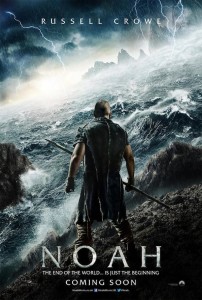In 2007, my hubby accepted his first college faculty position, and we moved from Indiana to the Great Pacific Northwest. He began teaching at Multnomah Bible College, and I was thrilled to have access to their amazing library resources. Besides the fantastic research possibilities, I also scoured their shelves for biblical novels and found an intriguing series, The Genesis Trilogy by Kacy Barnett-Gramckow.
All three books were FASCINATING! I was immediately enthralled with the stories of Noah’s family pre-flood, post-flood, and the enduring generations leading to the Tower of Babel. Kacy’s incredible research and biblically driven imagination made these stories both real and inspirational.
 So…when I first heard of a “Noah movie” coming to theatres, I emailed Kacy and asked if she’d be willing to write a movie review for my newsletter subscribers. She graciously dragged her hubby to Noah’s opening night for date night (thanks to her hubby, Jerry, for being a good sport).
So…when I first heard of a “Noah movie” coming to theatres, I emailed Kacy and asked if she’d be willing to write a movie review for my newsletter subscribers. She graciously dragged her hubby to Noah’s opening night for date night (thanks to her hubby, Jerry, for being a good sport).
Here’s what Kacy has to say about Hollywood’s version of the Genesis account she has studied so thoroughly:
Kacy’s Review:
 When I wrote The Heavens Before for Moody Publishers, a novel inspired by the Great Flood, I was so enthralled by the research that I continued to study Genesis for years after I completed my novel. Indeed, the Book of Genesis offers so many potential plot twists that I had difficulty narrowing down the entire epic tale of Noah’s Flood into a mere 90,000 words.
When I wrote The Heavens Before for Moody Publishers, a novel inspired by the Great Flood, I was so enthralled by the research that I continued to study Genesis for years after I completed my novel. Indeed, the Book of Genesis offers so many potential plot twists that I had difficulty narrowing down the entire epic tale of Noah’s Flood into a mere 90,000 words.
The Nephilim alone deserved an entire novel, as did the amazing topography of the Genesis world, which was lost by our own evil. Therefore, I was excited to see Noah hit the big screens. Six-year-old-going-to-the-circus excited! Unfortunately, I saw the movie, and Aronofsky’s Noah left me…
See? I couldn’t even finish that sentence because the movie took me nowhere.
First, let me say that I did enjoy certain aspects of the movie:
Mid-voyage, when Noah recites the Creation story, the accompanying imagery is captivating, even lyrical despite its subtle evolutionary tweaks. I longed for the entire movie to be as beautiful.
For those of us who believe that Noah and his kin were vegan—and I do—it’s in the movie…with a twist: The bad guys are cannibals. Bravo!
Also, director Darren Aronofsky, whether he intended to or not, honored his heritage by never naming God. Instead, he refers to the Lord as ‘Creator’ and ‘He’—and I appreciated this approach to the story.
And, finally, the atrocious level of Earth-killing violence is represented to the full extent of the film’s PG-13 rating. I’ll be the first to say that when I wrote The Heavens Before, it didn’t approach the horrific reality of life on Earth during Noah’s generation. I softened the violence to spare my tender-hearted audience.
Where did Aronofsky’s Noah leave me wanting to jump off the ark?
It started with the Watchers, who could have been show-stopping as half-human-half-demon giants, potentially referred to in Genesis as Nphiyl, or Nephilim. The word Nephilim translates to English as a ‘feller’ as in ‘one who brings down.’ i.e., a bully, a tyrant, a giant. Nephilim alone could have rocked this movie. Instead, the Watchers are actually giant rock-creatures who look like Transformers and move like Ents from the Lord of the Rings. Their presence diminished the story when they could have driven the conflict to colossal heights.
Other parts of the movie seemed spiritually conflicted. A snakeskin tefillin-type arm band worn by Lamech and Noah, has evidently been handed down through generations. Was this supposed to represent the shed skin of the Serpent in Eden? If so, why?
As for the film’s much-talked-about environmentalist leanings, let me preface my observations by stating that I’m on board with being responsible stewards of the Earth’s resources. The idea is actually Biblical. Didn’t the Lord place Adam in a garden in Genesis to care for the animals and plants? Truly, our Creator loves His Creation, but He loves humans so much that He strives to save us from our own sins—in a Flood to cleanse the corrupted and dying first world, and through a personal relationship with Him, through our promised Messiah.
By contrast, Aronofsky’s perfect world according to his Noah is a world without humans who will pollute and destroy the plants and animals. However, if this had been the Lord’s ultimate plan for Earth, then He would have stopped Creation on day 5.5. Instead, deeply grieved, He commanded the righteous Noah to build and take shelter in the ark with two of each kind of animal, allowing Him to cleanse the dying first world and allow Earth a fresh start, in addition to protecting His plan: to preserve and build a relationship with humans for His joy and His glory.
Which leads me to my final observation: Aronofsky’s Noah presents a world without hope, doomed to fall again—a world created in film format, which lacks the true intent of the Book that inspired it…and the eternal intent of the Book’s Author.
Thank You, Kacy!
Kacy’s review of Aronofsky’s Noah is spot-on with the experience my hubby and I had when we, too, saw the movie on opening night. Speechless, we left the theatre sort of dazed and disappointed, but trying to remember that ANY movie that starts a conversation about God’s Word CAN BE a good thing.
So, let’s start a conversation!
Have you seen the movie? What did you think? Let’s chat about it on Facebook or in the comments below.
Tweet-A-Licious!
Join the conversation about Aronofsky’s Noah movie on Mesu’s blog today!


